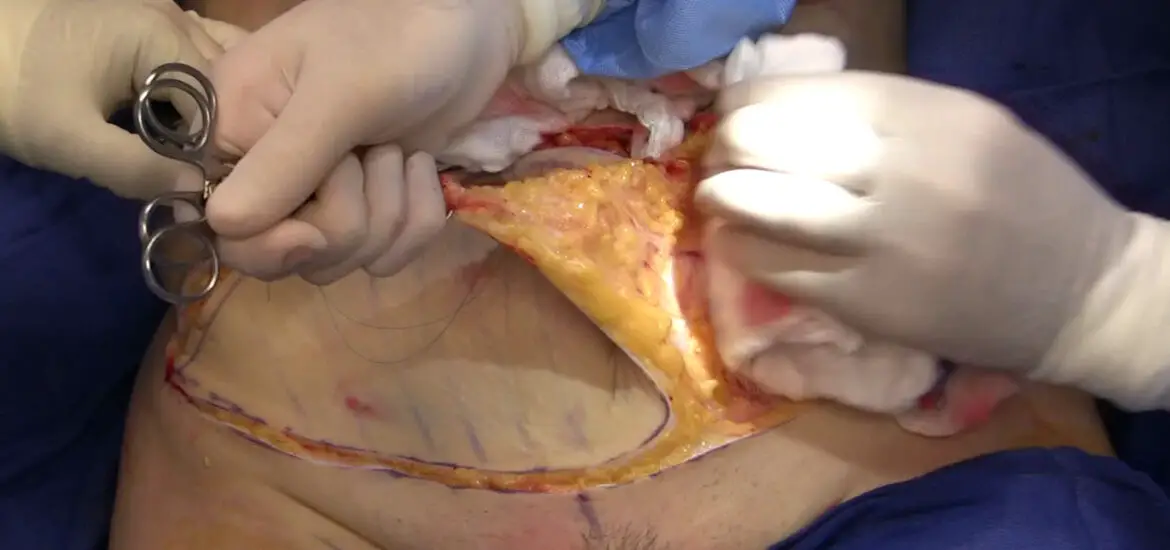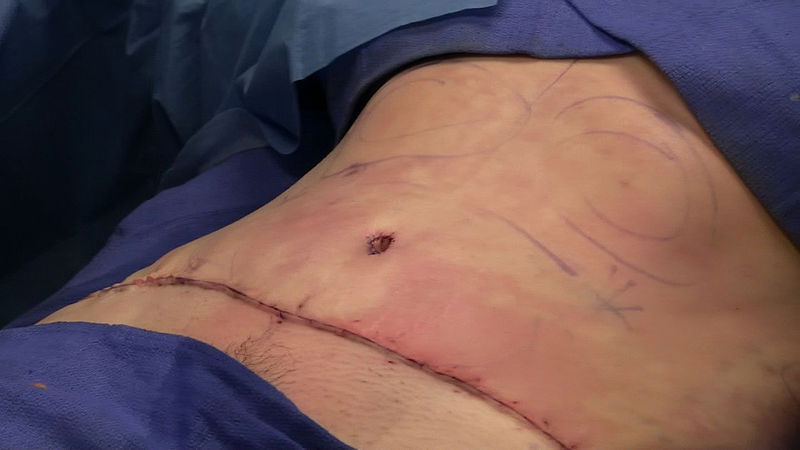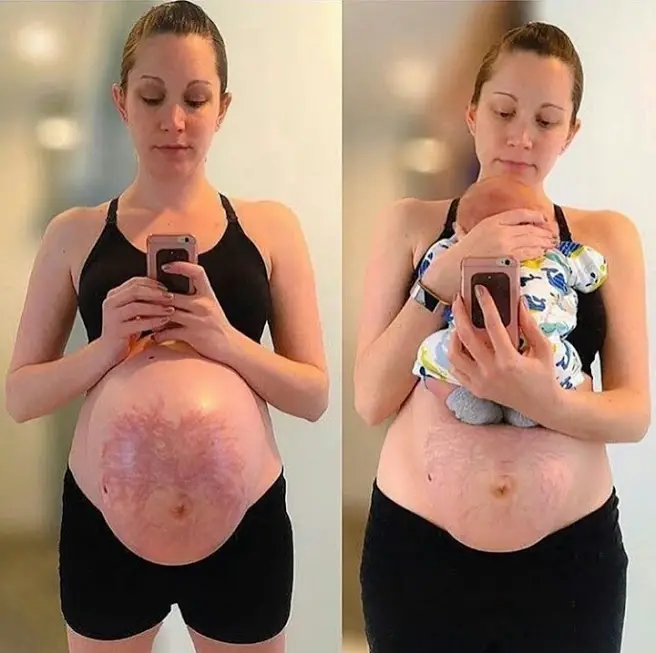Sometimes, the only remedy to excess weight is bariatric surgery. But how do you care for skin after bariatric surgery? And what do you need to do before the surgery?

Table of Contents
How to Prevent Loose Skin After Bariatric Surgery
Before undergoing bariatric surgery, it is crucial to learn how to prevent having loose skin afterward. So, here are ways to avoid it:
1. Look After Your Skin
Looking after your skin before the surgery is, perhaps, the most effective method of avoiding loose skin after the weight loss surgery. Part of looking after the skin is using lotions and creams that contain elastin and collagen. These make the skin elastic.
While the molecules of elastin and collagen may be too big for the skin to absorb from creams and lotions, they are still good enough for a bit of skin tightening. Therefore, don’t shy away from regularly using them long before surgery.
2. Take Collagen
Apart from using suitable creams and lotions, you can take collagen as supplements or eat foods that boost its production. Collagen hydrolysate is collagen in its processed form, and you can cand it in powdered form at natural food stores.
Also, take bone broth on a regular basis because it is a good source of collagen. Ingesting collagen is more effective than using collagen-rich lotions and creams. But you have to follow it up with exercising and eating balanced meals.
3. Always Eat a Balanced Meal
A balanced diet helps in the general health of your skin. Eat foods rich in protein, vitamins, Omega-3, zinc, etc. In addition, drink a lot of water; not only does it keep you hydrated, but it also boosts skin hydration. When your skin is healthy, it increases elasticity, causing loose skin to firm up quicker and easier. And when your skin is hydrated, elasticity is better.
4. Exercise Regularly
The place of physical exercises cannot be overemphasized. Exercising, especially strength training, helps to build muscle mass. And when you build the muscle mass in your body, it fills up the space under your skin and tightens it. Besides, you will keep losing weight as you exercise, eliminating the chances of regaining lost weight. But start slowly and pick the pace, especially if you are not used to exercising.
5. Go for Surgical Procedures
If all else fails, consider undergoing surgery to remove the excess skin. You might need the surgery if you lose a lot of weight during bariatric surgery. That means you will have a lot of excess skin that needs to go.
Speak with your doctor to determine the best step for losing the skin and how soon after the bariatric surgery you can undergo another surgery. And ensure you can afford it before you go down that route.
Will I Have Loose Skin After Weight Loss Surgery?
Whether or not you will have loose skin after weight loss surgery depends on a few factors.
First, consider your genetics. Genetics determines the outcome of different things in your life, and you cannot change it. For some, they will have loose skin that may never fully tighten, no matter what they do. Others will have some loose skin, but not too much. And it won’t take long to tighten it.
Second, consider your age. The older you are, the less elastic your skin is. If you lose weight at an older age, you are more likely to have loose skin than a younger person. And it may take longer for the skin to tighten.
Third, consider your lifestyle before the surgery. Eating well and exercising make the skin healthier and better able to tighten post-surgery. The same is true if you keep yourself hydrated regularly. But poor nutrition and habits, such as smoking, weaken the skin and make it harder to tighten if you lose a significant amount of weight.
Fourth, consider how much weight you plan to lose. The more weight you lose, the higher the chance of having loose skin. The amount of loose skin will differ based on body size and style, but there will be loose skin if you lose a lot of weight at once.
How to Tighten Loose Skin After Weight Loss Surgery
How well the skin tightens after undergoing a weight loss surgery depends on a few factors. There are genetics and age to consider and the amount of lost weight and nutrition before the surgery.
There are also some medical conditions that thin the skin and reduce the resident collagen. However, there are natural and medical ways to tighten your skin after losing weight through surgery.
Natural Methods
To tighten loose skin after a weight loss surgery naturally, ensure you eat well. Have balanced nutrition that you follow and stick with it. Your meals must contain vitamins, proteins, Omega-3, and other nutrients recommended by the doctor.
It is important to note that undergoing bariatric surgery changes how the digestive system operates. The ability of the intestine to absorb different nutrients is no longer the same. So, it is crucial to take supplements and monitor the level of nutrients in your body. You are more prone to malnutrition because of this factor. Therefore, how you eat is of high priority.
Exercising will also help tighten loose skin after a weight loss surgery. Workouts will build muscles under your skin to fill up the space and stretch your skin taut. You will see less loose skin and more firmness with time because of the muscles. In addition, exercising keeps you fit and strong.
Before you start exercising after surgery, you must be cleared by your doctors. You may need a few weeks to recover after the surgery. After that, speak with your doctor about starting workout sessions.
You may also consider using creams and lotions that tighten and firm up the skin. However, there is no guarantee that they will work as well as proper nutrition. Even if they do work, it may take a long time to see the first results. And you have to be consistent in their usage to keep seeing the results.
Medical Steps
Body contouring is an effective way to tighten loose skin after bariatric surgery. Cryotherapy and laser treatments are some of the body contouring procedures to consider if you want to go the surgical route. Note that they may not give you all the results you are looking for, and not immediately. It will take several sessions over some months before you begin to see results.
But if you want quick results, consider going under the knife again. You will lose most of the excess skin if you use surgery.
The bottom line is that you can tighten loose skin after weight loss surgery. If you don’t mind waiting and putting in the work, you can eat well and exercise. It may take a while, but you will have long-lasting results and come out healthier than ever. But if you want quick results, you will have to undergo surgery to cut the loose skin off.
Click here to read these interesting articles…
Skin After a Facial [Problems, Solutions & Care]
Skin After a Burn [Cases & Remedies]
Skin After Sunburn [Problems & Treatments]
Skin After Birth [Problems & Remedies]
Skin Issues After Bariatric Surgery – Remedies
If you lose a significant amount of weight with surgery, you will have a considerable amount of loose skin. As a result, skin folds may rub against each other and cause irritation. You may have rashes, redness, and even dryness on your skin. All these come from skin chafing. And if the skin breaks open, it may lead to other complications such as infection.
To handle these issues, you can wear compression clothing. It will reduce the look of excess skin in the short run and reduce the folds. That way, your skin does chafe and irritate. You can also use powder to keep the skin between folds dry and eliminate skin breakage from excess chafing.
Severe Skin Issues from Bariatric Surgery
Many skin issues that appear after bariatric surgery don’t stem from skin rubbing against skin alone. Complications can arise from poor nutrition. Weight loss surgery tends to disrupt the regular order of the digestive tract and make it unable to absorb all the nutrients the body needs.
Consequently, the body lacks what it needs to function, and the skin shows what the body is lacking. Apart from rashes, itching, and redness, you may find skin issues such as seborrheic dermatitis, alopecia, glossitis, skin cancer, delayed wound healing, acne, xeroderma, and pellagra.
Other skin conditions that may arise are atopic dermatitis, purpura, mucositis, oral mucosa ulceration, wrinkled skin, depigmented, brittle, and dry hair, angular cheilitis, and hematoma, to name a few.
These skin issues result from a deficiency in nutrients such as biotin, vitamins A, B2, B3, B5, B6, B9, B12, C, D, E, K, protein, zinc, iron, copper, and selenium.
To handle these issues or prevent them from happening, go for consultations with your doctors before undergoing surgery. Be aware of the results and possible complications from the surgery and how it will affect your nutrition. Then, find out if there are things to do to prevent them from happening.
If you have already undergone surgery, have your doctor keep an eye on your feeding and general nutrition. Your body is vulnerable and needs special medical attention. And your meals must be rich in the nutrients mentioned above. You may request your doctor or a nutritionist to draw up a healthy daily meal plan to follow.
Does Insurance Cover Excess Skin Removal After Bariatric Surgery?
Insurance may cover part of the skin removal procedure, but not all. Most people who undergo bariatric surgery to lose considerable weight tend to think they have to pay for everything since it is elective surgery.
Sometimes, excess skin after bariatric surgery is considered a health concern. So, insurance companies cover the cost of the skin removal procedures. The companies consider when you do the surgery and how much weight you lose. For example, if you underwent bariatric surgery less than a year ago and lost 100 pounds or more, you are likely to get insurance coverage for excess skin removal surgery.
The reason is that such a significant weight loss will mean excess loose skin. And excess loose skin can cause skin issues such as rashes, itching, extreme dryness, chafing, ulcers, and even infection. If nothing else seems to work in treating the skin issues, an insurance company will cover the cost of surgically removing excess skin.
Recap
If you choose bariatric surgery, it is usually because you need quick results, and you probably have a lot of weight to lose. But while it is a surefire way of losing excess weight, your skin after bariatric surgery may be of some concern.
Therefore, before surgery, take steps to minimize the appearance of loose skin. And remember that your nutrition plays a crucial role in the general health of your skin after surgery. However, every skin issue after bariatric surgery has a remedy, and you can speak with your doctor if you have concerns.

